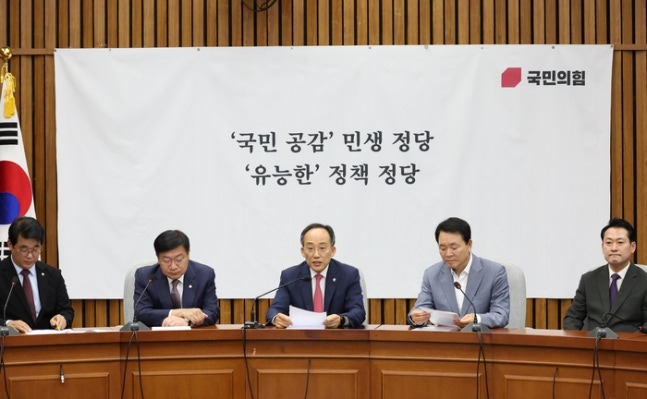
Choi Kyung-ho, floor leader of the People Power Party, speaking at the party’s strategy meeting held at the National Assembly on the 4th. Yonhap News,
,
, ‘As of the day before the opening of the first plenary session of the 22nd National Assembly on the 5th, the ruling and opposition parties have not yet reached a consensus on the composition of the floor. The background is that they have not been able to narrow their differences over the positions of the chairs of the key standing committees, the Legislation and Judiciary Committee and the Steering Committee. The Democratic Party of Korea is pressuring that the composition of the floor must be completed by the 7th according to the National Assembly Act, while the People Power Party is insisting that it is impossible without an agreement between the ruling and opposition parties.’,
,
, ‘On the 4th, the People Power Party and the Democratic Party continued their negotiations on the composition of the floor. Choi Kyung-ho, the floor leader of the People Power Party, told reporters after the plenary meeting, “We need to quickly prepare a consensus on the composition of the floor so we are constantly in dialogue with the opposition.” Noh Jong-myeon, the Democratic Party’s floor spokesperson, also told reporters after the plenary meeting, “Today, we will hold discussions between the floor leaders of both parties and tomorrow, the 2+2 negotiations between the floor leaders and deputy floor leaders will take place according to the Democratic Party’s position.”‘,
,
, ‘Even as the first plenary session of the 22nd National Assembly approaches, the ruling and opposition parties have not reached an agreement on the composition of the floor due to the distribution of positions such as the Chairpersons of the Legislation and Judiciary Committee and the Steering Committee. Both parties are not willing to give up the positions of the chairs of the Legislation and Judiciary Committee and the Steering Committee. The Legislation and Judiciary Committee plays a role as a “threshold” for bills coming from each standing committee to be put to a vote in the National Assembly. The Steering Committee functions as a check on the presidential office.’,
,
, ‘The Democratic Party’s position is that the party, as the largest party in the floor, should have 11 out of the 18 standing committee chair positions, including the chairs of the Legislation and Judiciary Committee and the Steering Committee, while the People Power Party should have 7. They also argue that they must finalize the composition of the floor by the deadline set by the National Assembly Act on the 7th. Park Chan-dae, the floor leader, said, “As the deadline for the composition of the floor set by the National Assembly Act is approaching, the People Power Party is still delaying and avoiding negotiations by citing conventions” and emphasized that “the National Assembly Act is more important and takes precedence over conventions.” The Democratic Party also indicated that if the ruling and opposition parties fail to agree on the composition of the floor by the 7th, they may forcibly proceed with a vote on the floor composition issue even if it is unilaterally.”,
,
, ‘On the other hand, the People Power Party insists that since the Democratic Party, as the largest party in the floor, has taken the position of the National Assembly Speaker, the chair of the Legislation and Judiciary Committee should be the responsibility of the People Power Party, the second largest party. They argue that if the Democratic Party takes the position of the chair of the Legislation and Judiciary Committee, they should give up the position of the National Assembly Speaker. They also claim that, in accordance with parliamentary law, the deadline for the floor composition is a flexible provision without legal force, so agreement between the ruling and opposition parties should take precedence. Floor leader Choi said, “It is difficult to find a precedent where the composition of the floor was unilaterally determined without agreement between the ruling and opposition parties in any previous parliament.”‘,
,
, ‘On the 5th, the People Power Party will hold a general meeting of members to discuss the floor composition and attendance at the plenary session. Floor leader Choi said, “We will determine the action direction of our party based on the results of the dialogue (with the Democratic Party).” A People Power Party floor official said in a phone call, “Depending on the outcome of the negotiations with the Democratic Party, boycotting the National Assembly session may also be considered” and said, “The concrete conclusion will be made at the general meeting of members.”‘,
,
, ‘At the first plenary session of the parliament, the election of the Speaker of the National Assembly is scheduled. The Democratic Party has nominated a five-term senior member, Woo Won-sik, as the National Assembly Speaker, and a four-term member, Lee Hak-young, as the party’s share of the Vice Speaker of the National Assembly. There is a possibility that the People Power Party may nominate one of the multi-term members such as Jo Gyeong-tae, Joo Ho-young, as their share of the Vice Speaker of the National Assembly. A floor official said in a phone call, “The multi-term members are organizing who will become the Vice Speaker of the National Assembly among themselves,” and asked, “Will there be a primary election?” If Representative Jo is elected as the Vice Speaker of the National Assembly, he will have a higher seniority than Representative Woo, who is expected to become the National Assembly Speaker. This breaks the tradition that the member with the most terms has served as the Speaker of the National Assembly.’

